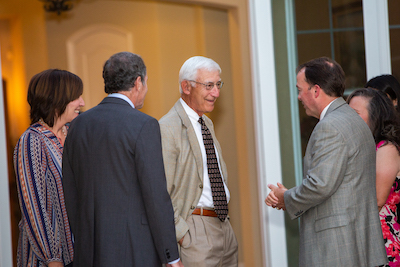Orloffs Remembered at Dinner and Lecture on “Surgical Leadership: Lessons Learned”
Oftentimes, leaders are thought to be lone warriors who depend on an innate sense of heroism to pave the way. But according to Layton “Bing” Rikkers, MD, FACS, that’s not how a true leader behaves.
Dr. Rikkers is Professor Emeritus of Surgery at the University of Wisconsin-Madison, where he served as the A.R. Curreri Professor of Surgery and Chairman from 1996-2009. He has, in addition, led a long-time leadership training through the American College of Surgeons. Late last month Dr. Rikkers presented the UC San Diego Department of Surgery Marshall J. Orloff Lecture on “Surgical Leadership: Lessons Learned,” which deconstructed the qualities of a good leader as reflected in two books Dr. Rikkers considers to be personally influential: “Primal Leadership” by Daniel Goleman and “Leadership Secrets of Attila the Hun” by Wess Roberts.
Rikkers was selected to give the lecture both for his preeminence in the world of American surgery and because his clinical interests parallel those of the late Dr. Orloff, the founding chair of the UC San Diego Department of Surgery. Orloff, according to Rikkers, may have been a tough leader, but he didn’t lead by himself. He had the support and collaboration of his late wife, Ann Orloff, MD, an esteemed clinical professor of radiology, as well as the support of a long list of mentees and proteges.
The evening prior to the lecture, some of these inpiduals, as well as other friends, family and former colleagues of Marshall and Ann Orloff, gathered to celebrate and appreciate their lives. (See sidebar for a list of notable guests.)
During his talk, Rikkers recalled a conference years ago where he tried to take issue with an aspect of one of Orloff’s papers on portal hypertension, one of Orloff’s research specialties. Rikkers still remembers Orloff’s firm but brilliant rebuttal.
“He had me for lunch and then, he spit me out in pieces,” Rikkers said, chuckling.
Rikker then presented an hour-long talk on the 10 qualities of a good leader and good leadership strategies by way of Goleman and Roberts. Among the highlights of his talk:
- The heart is more important than the brain. According to Rikkers, the most important emotional qualities for leaders are communication, fairness, trust and defining core values. He suggests implementation of an open-door policy, paying attention to “hallway chatter” and actively staying engaged with office issues.
- Multiple leadership styles are necessary for success. In the past, says Rikkers, autocratic, patriarchichal leaders were admired for being so. Now departments are more independent and staff/budgets are much larger with hospitals often in control, so patriarchal leaders are not tolerated
- Decision-making is unavoidable. True leader’s decisions are not made to benefit themselves but often even put them at a disadvantage. The legacy of leaders is measured by their impact. Rikkers suggests being an invested mentor, ready to one day enjoy being surpassed by one’s mentee.
- Traditions are important! Make sure that as a leader, past traditions are respected and revered. Change should only come gradually.
- Establish your credibility during the beginning of your leadership term to gain the support of colleagues.
- A true leader does not need to lead alone — leadership is a team effort. Learn the power of delegation and mentorship.
- Lead your troops into battle. Surgical leaders should be clinically active in order to be the best leaders.
- Carrots work. Encourage healthy competition, but contain it when it becomes unhealthy. Surgery is the engine of most hospitals and economic incentives are essential.
- It is a challenge to serve two or more masters. Surgical faculty/staff are your principal masters but you will also answer to institutional leaders above you.
- Don’t do what can’t be done. Don’t engage in wars you cannot win. Don’t attempt the un-doable.
Rikkers words of advice aren't derived merely from his own experience: Calls for leadership training among physicians are increasing as burn-out and dissatisfaction among physicians grows nationwide. And what's good for the doctor is also good for the patient. A recent article in the New York Times brings this to bear: "Most people think of doctors as scientists, caregivers or educators," writes Druv Khuller, MD. "But we must also understand doctors as leaders. Physician leadership is critical for better patient outcomes, clinical performance and professional satisfaction."
Notable Guests
Rick and Kathy Santore
Ira Levine
Jack Delaria
Peter Taft
Paul Chasan
Denise Moossa
Layton Rikkers
Dick and Stephanie Coutts
Johan and Mrs. Brahme
Haile Debas
David Hoyt
Kaj Johanson
Bill Harris, Sr
Ralph Dilley


